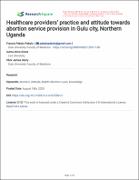Healthcare providers’ practice and attitude towards abortion service provision in Gulu city, Northern Uganda
Date
2020Author
Pebalo, Francis Pebolo
Auma, Anna Grace
Obol, James Henry
Metadata
Show full item recordAbstract
Background: Unsafe abortion is a growing public health problem concern globally despite being
preventable. The World Health Organization estimates that about 20 million pregnancies results into
unsafe abortion globally. The proportion of unsafe abortion has been increasing with developing
countries contributing about 97% of unsafe abortions cases including Uganda. Unsafe abortion is among
the four leading causes of pregnancy related mortality, injuries, and disability globally. The restrictive
abortion laws and religious situation make abortion a highly controversial social issue in Uganda leading
to high stigma in the society, and a majority of the healthcare providers are reluctant to perform an
abortion even if indicated for fear of possible legal consequences.
Methods: We conducted survey among health worker about knowledge of complications, practice, and
attitudes of induced abortion between September and November 2019 among 252 healthcare providers
in Gulu Municipality, Northern Uganda. Multivariate analysis showed associations between healthcare
providers' characteristics and adequate knowledge about abortion complications. Ordinary least square
regression analysis found associations between providers' characteristics and their intention for general
support, generally not in support, conditional support for abortion provision, as well as their personal
attitudes and beliefs against or towards abortion provision.
Results: The mean attitudinal score for generally in support, generally not in support, conditional in
support, personal attitude, and beliefs against and toward abortion provision were 2.80, 2.71, 2.86, 3.239,
and 3.35 respectively. Participants who were married and practice Anglican religion were more likely to
have good knowledge of abortion complications, p-values 0.035, and 0.042 respectively, meanwhile
participants who were employed in faith-based facilities were more likely to have poor knowledge of
abortion complications p-value 0.002.
Conclusion: Ministry of Health and stakeholders need to provide training of health workers to improve
quality of abortion services. Medical training institutions should ensure that students understand the
laws and responsibilities that govern their professional actions with respect to abortion care regardless of
their personal views, beliefs, and attitudes.
Collections
- Research Articles [13]

